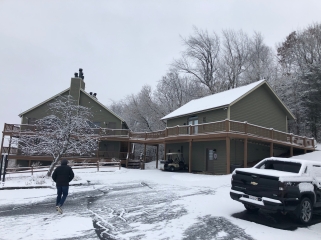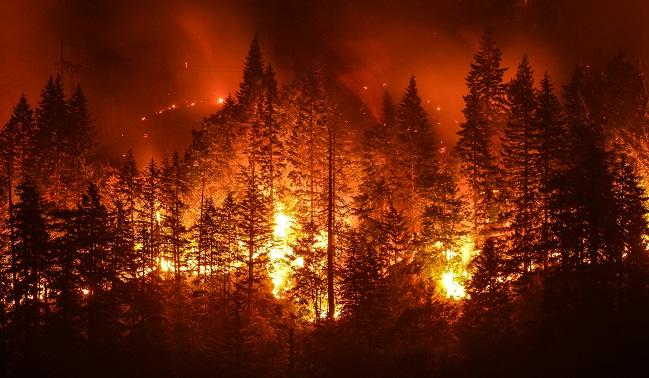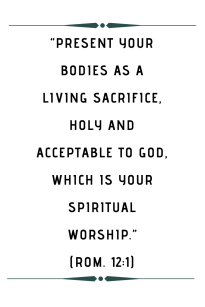The following sermon was preached at the Lutheran School of Theology at Chicago‘s Augustana Chapel on the occasion of the ordination of the Rev. Allison Bengfort, who was a student of mine when I was the pastor with St. Luke’s Lutheran Church of Logan Square. Pastor Bengfort now serves St. John’s Evangelical Lutheran Church in Wilmette, IL.
Texts: Exodus 3:1-12 + Psalm 46 + Romans 12:1-18 + Luke 4:16-21
 A few weeks ago, just before Thanksgiving, my husband and I took our dog and headed west to Galena, a former mining town that’s now pretty much a resort area near the Mississippi River. We picked the lodge where we stayed because it was dog-friendly, and we didn’t want to have to board our puppy for the weekend, but the thing I was most looking forward to was the wood-burning fireplace in our room.
A few weeks ago, just before Thanksgiving, my husband and I took our dog and headed west to Galena, a former mining town that’s now pretty much a resort area near the Mississippi River. We picked the lodge where we stayed because it was dog-friendly, and we didn’t want to have to board our puppy for the weekend, but the thing I was most looking forward to was the wood-burning fireplace in our room.
I love fire. Maybe it’s just that I like to be warm. During the winter when I was a boy, I would sit in front of the heating vents in the dining room with a blanket wrapped around me and pressed up to the wall to make a tent and trap all the hot air. If she was nice to me, I’d let my sister join me. But fires aren’t just about the warmth they give off. They are powerful. The process of combustion allows us to cook our food, heat our homes, power our cars, generate electricity. It also poses a threat, think of all the Christmas trees drying out near burning candles this season, or the wildfires in California that devastated the land, incinerating homes and leading to the loss of just over a hundred lives. Fire, by its very nature, consumes.

As we settled into our room, I immediately set to work building a fire in the fireplace. I stacked the wood perfectly on the wrought iron hearth, nestling smaller pieces of wood near the bottom, just above the rolls of newspaper I’d tucked below the bars. Once I was satisfied that I’d done everything right, I struck a single match and quickly lit the kindling, blowing lightly at the base of the quickly spreading fire to fan the flames. “One match,” I bragged to my husband, as the fire began to roar. I cracked open a book and settled into the comfiest corner of the living room sofa. It didn’t take long for my eyes to grow heavy, and for me to fall asleep.
Napping in front of the fireplace is exactly what I’d wanted out of that weekend. I’d arrived at the lodge feeling drier than the wood stacked in the corner of the room. I was dried out by the effort to keep up with all the work on my various to do lists. I was dried out by a news cycle that continuously fanned the flames of my despair and anger at the world as it is. I was dried out by a season of grief that was burning through every reserve of strength in me. I was being consumed.
 The thought, therefore, of presenting my body as a living sacrifice, holy and acceptable to God, is somewhat terrifying. Because I have to confess to you all that there have been times in my ministry when I have done this, when I have placed my life on the altar of my calling and watched it burn. There have been weeks when I barely saw my husband. There have been seasons in which I read nothing for pleasure. There have been years that flew by in which my focus was so singularly on the health and well-being of the church, that my own health and well-being suffered. Studies on clergy health offer me only the consolation that I am not alone in these bad habits.
The thought, therefore, of presenting my body as a living sacrifice, holy and acceptable to God, is somewhat terrifying. Because I have to confess to you all that there have been times in my ministry when I have done this, when I have placed my life on the altar of my calling and watched it burn. There have been weeks when I barely saw my husband. There have been seasons in which I read nothing for pleasure. There have been years that flew by in which my focus was so singularly on the health and well-being of the church, that my own health and well-being suffered. Studies on clergy health offer me only the consolation that I am not alone in these bad habits.
Perhaps it’s gauche to talk about clergy burnout on the day of Allison’s ordination, but I prefer to think that I am holding true to the promises I made in my ordination, not to offer false security or illusory hope. To pretend that there is not a fire burning in the church and in the world would be both. There is a fire burning, across the church. When I began my ministry in Chicago a little over a decade ago, there were approximately 220 congregations in our synod. I don’t have the precise number in front of me, but I believe we’re closer to 180 now. That’s a 20% decline a decade. It’s not just us, the ELCA. The Pew Research Center, which has been reporting for years on demographic shifts in religious identity and practice, places our experience in the broader context in which Christian affiliation, particularly among young adults, is declining and the number of those who do not identify with any organized religion, Christianity or otherwise, is on the rise.
As this fire continues to burn, all sorts of things are being consumed, not just the cherished buildings that can no longer be maintained, but traditions that no longer speak to new generations and assumptions about where and how people will choose to spend their time and money. Here at the seminary, it can feel like we’re preparing class after class of smokejumpers, parachuting into ecclesiastical wildfires all across the religious landscape, to bring life-giving water to people and places that can no longer even name the ways in which they are parched.
 It is with heart and mind singed by these relentless temperatures that I find myself once again transfixed by the image from Exodus of Moses standing before the burning bush. When Moses first sees it, he says, “I must turn aside and look at this great sight, and see why the bush is not burned up.”
It is with heart and mind singed by these relentless temperatures that I find myself once again transfixed by the image from Exodus of Moses standing before the burning bush. When Moses first sees it, he says, “I must turn aside and look at this great sight, and see why the bush is not burned up.”
Yes, this is the miracle I need, in every part of my life, to observe a living thing, burning but not consumed. Could it be true? Could it be true for our world and our nation? Could it be true for our church and its congregations? Could it be true for my life and my future? Can a thing burn and not be consumed?
In his blessing to me and Kerry on the day of our wedding, my father offered the following insight about the power of combustion. He said,
“On the farm where I was raised, my father’s arc welder did its work by bringing close — but always with a critical space between — two highly charged points. The energy, light, and heat is generated by the difference between the two. May you trust the arc of power that is created today as you draw together in this marriage.”
What an important reminder. The arc of power that allows the welder to sustain its flame is directly related to the space between the two points. The difference between them. This is what Paul seems to be saying when he reminds us that we have gifts that differ, even as we are part of one body. That is true in marriage as well as in the church, and it is the source of the power that fuels each of them. For the arc welder to work, the points must separate — but not too distant. It’s a delicate balancing act, respecting our differences while maintaining our common bond.
We are living in a time commonly described as being polarized. A recent report titled “The Hidden Tribes of America” summarizes research confirming what most of us intuitively sense: that in our public life,
“we have become a set of tribes, with different codes, values, and even facts. In our public debates, it seems that we no longer just disagree. We reject each other’s premises and doubt each other’s motives. We question each other’s character. We block our ears to diverse perspectives. At home, polarization is souring personal relationships, ruining Thanksgiving dinners, and driving families apart. We are experiencing these divisions in our workplaces, neighborhood groups, even our places of worship. In the media, pundits score points, mock opponents, and talk over each other. On the Internet, social media has become a hotbed of outrage, takedowns, and cruelty — often targeting total strangers.”
Compare that lived experience with the advice Paul offers to the church in Rome:
“I say to everyone among you not to think of yourself more highly than you ought to think, but to think with sober judgement, each according to the measure of faith that God has assigned … Let love be genuine; hate what is evil, hold fast to what is good; love one another with mutual affection; outdo one another in showing honor. Do not lag in zeal, be ardent in spirit, serve the Lord.” (Rom. 12:3,9-11)
Paul continues on with prescription for the fever heat that burns through our body politic: bless, rejoice, weep, associate, live peaceably with all.
Allison, you chose a set of texts for this day that speak plainly about God’s vision for a world liberated and restored: the liberation of the Israelites from Pharaoh, the proclamation of good news to the poor, release to the incarcerated, and freedom for the oppressed. What I want you to hear today is this: God’s dream for the world is not a job description for pastors, though this vision does appear in another set of sacramental vows.
When you were brought to the font, and each time we affirm our baptism, we remember and renew our promise to live among God’s faithful people, to receive the word of God and share in the Lord’s supper, to proclaim the good news of God in Christ through word and deed, to serve all people, following the example of Jesus, and to strive for peace and justice in all the earth. We offer our lives as a sacrifice in service of God’s great love for the world, and we ask God to help and guide us. We all make these vows. All of us, together.
All of us, together. That is the only way this fire can burn bright enough to cast the hopelessness from our hearts, the only way this fire can burn hot enough to clear away the undergrowth and prepare the landscape for whatever seeds God is now planting for the future. All of us together, that is how we burn without being consumed. That is the good news already fulfilled in the death and resurrection of Christ Jesus. All of us in, no one left out.
There is power in fire, in the arc that spans the distance between people and tribes, between us and God. Today we pray for that power, that fire, to be poured out on Allison, to cover her without consuming her. We pray for the Holy Spirit to come, to warm our hearts, to bless this pastor, to restore the church, to flood the world.
Come, Holy Spirit, come!